【2022中考英语一轮教材专题复习】外研九年级上册 Modules 1-3课件(共95张PPT)
文档属性
| 名称 | 【2022中考英语一轮教材专题复习】外研九年级上册 Modules 1-3课件(共95张PPT) |  | |
| 格式 | pptx | ||
| 文件大小 | 4.4MB | ||
| 资源类型 | 试卷 | ||
| 版本资源 | 外研版 | ||
| 科目 | 英语 | ||
| 更新时间 | 2022-02-12 12:13:42 | ||
图片预览

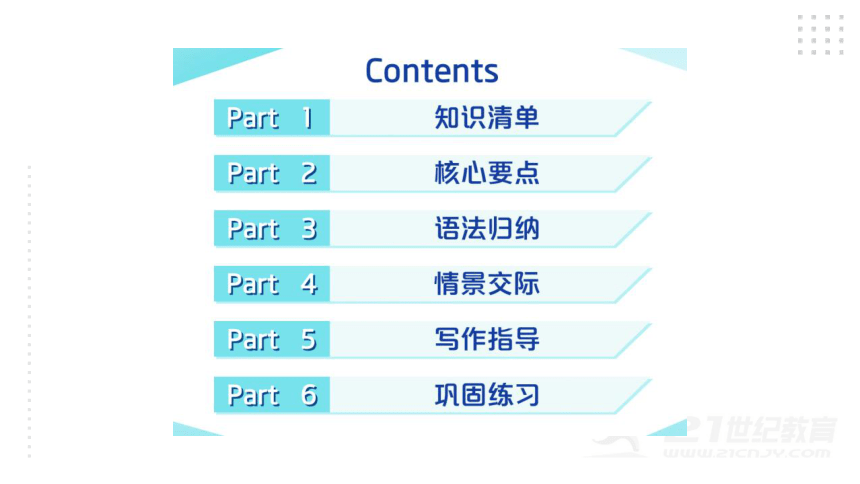
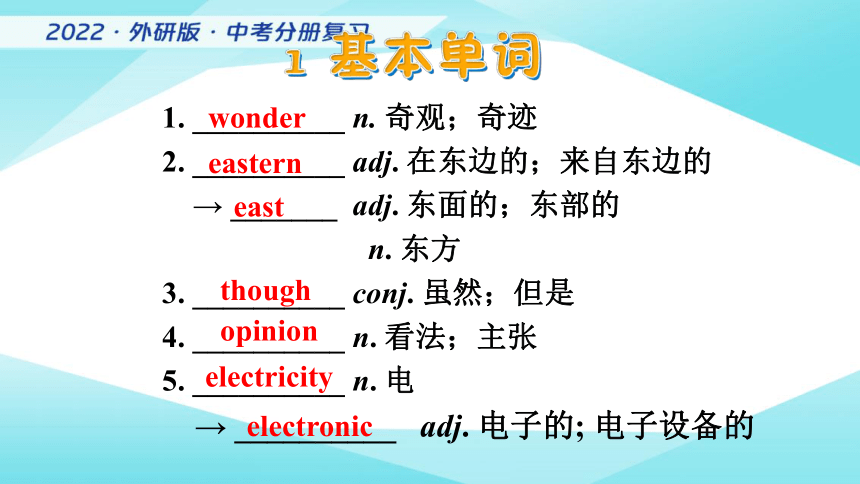
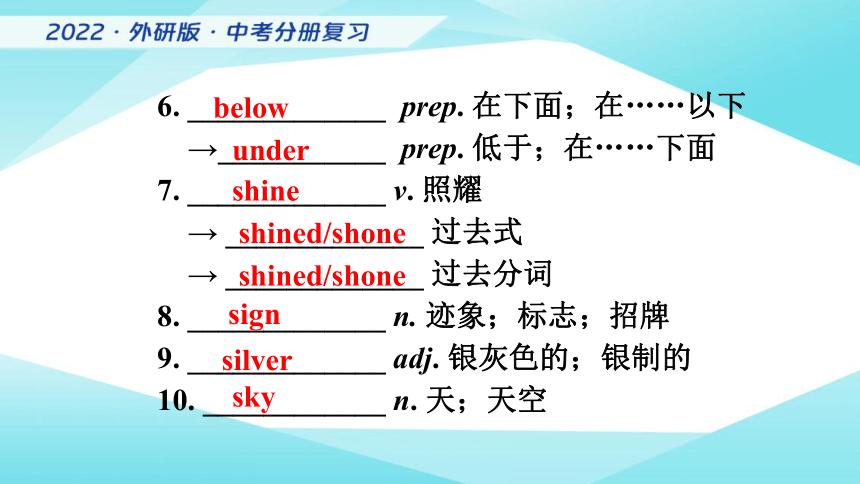
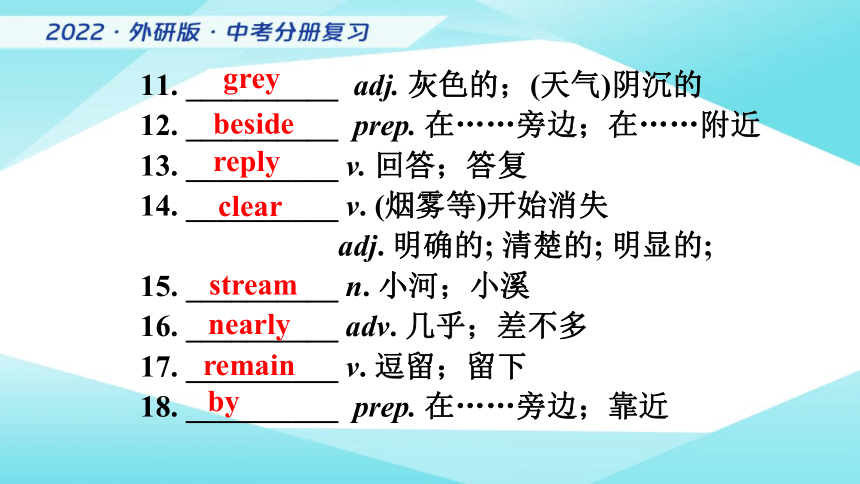

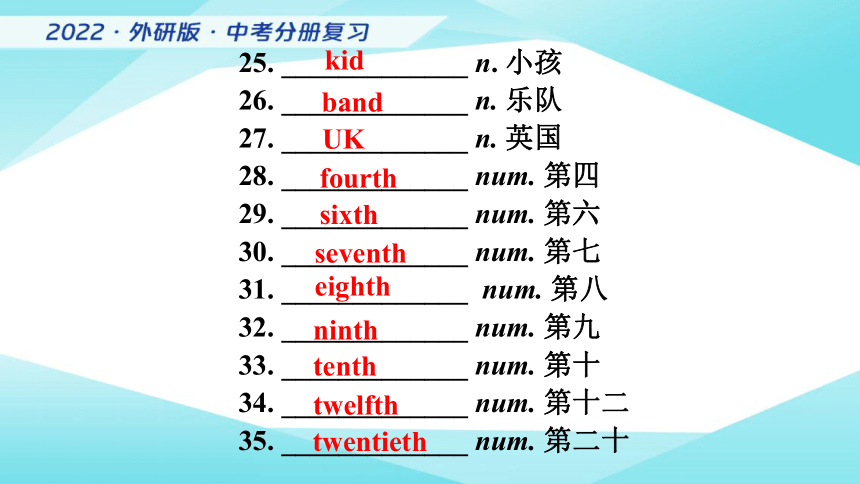
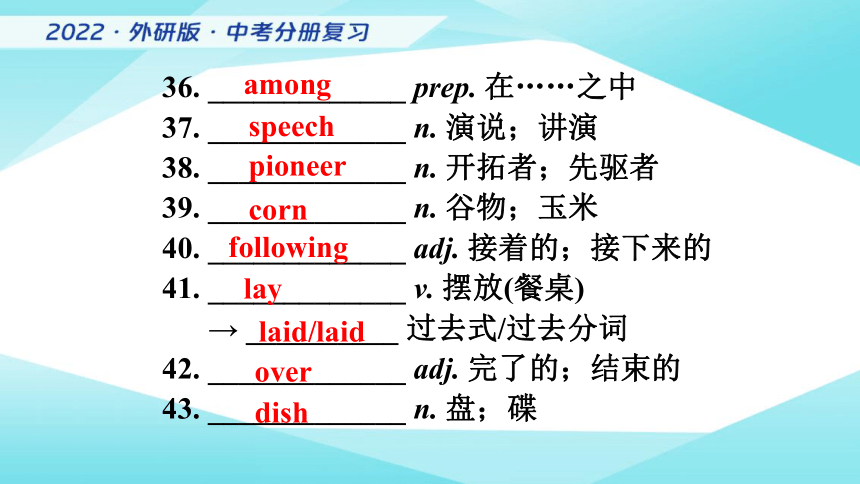
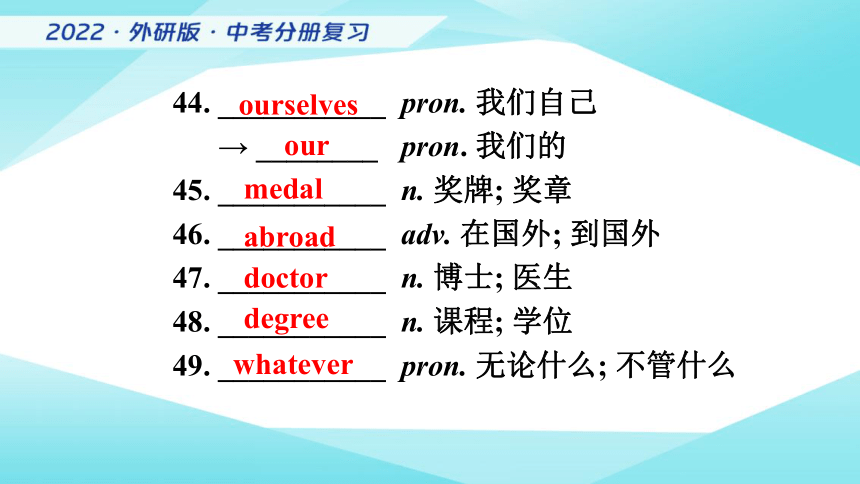
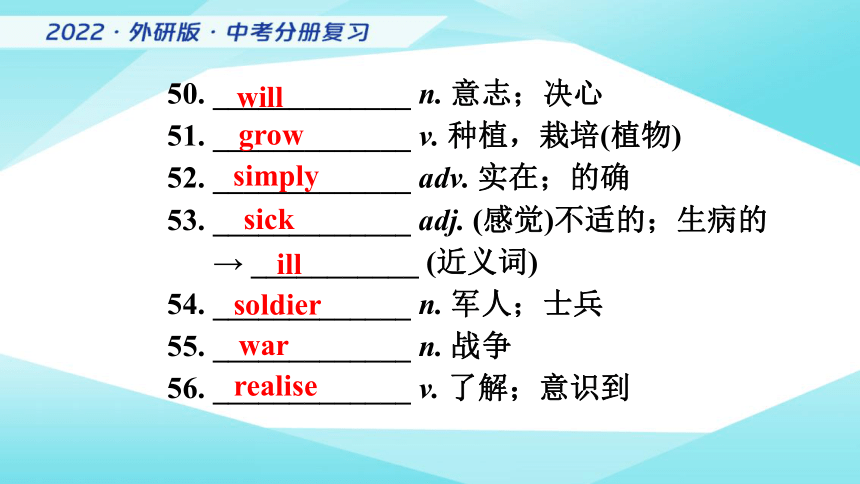
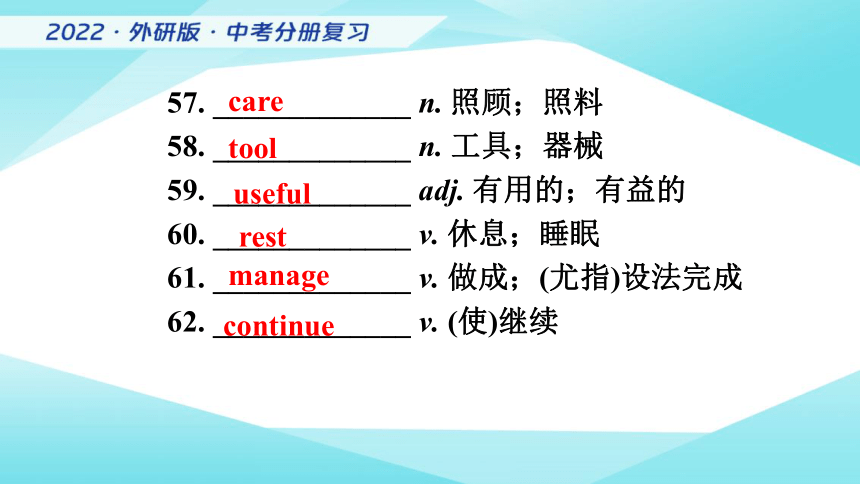
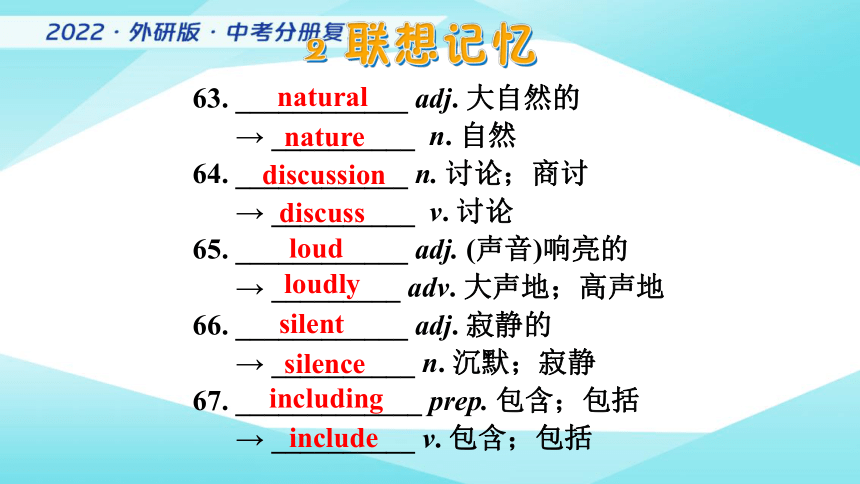
文档简介
(共95张PPT)
外研版九年级上册
Modules 1-3
Presentation
1. __________ n. 奇观;奇迹
2. __________ adj. 在东边的;来自东边的
→ _______ adj. 东面的;东部的
n. 东方
3. __________ conj. 虽然;但是
4. __________ n. 看法;主张
5. __________ n. 电
→ __________ adj. 电子的; 电子设备的
wonder
eastern
east
though
opinion
electricity
electronic
6. _____________ prep. 在下面;在……以下
→___________ prep. 低于;在……下面
7. _____________ v. 照耀
→ _____________ 过去式
→ _____________ 过去分词
8. _____________ n. 迹象;标志;招牌
9. _____________ adj. 银灰色的;银制的
10. ____________ n. 天;天空
below
under
shine
shined/shone
sign
silver
sky
shined/shone
11. __________ adj. 灰色的;(天气)阴沉的
12. __________ prep. 在……旁边;在……附近
13. __________ v. 回答;答复
14. __________ v. (烟雾等)开始消失
adj. 明确的; 清楚的; 明显的;
15. __________ n. 小河;小溪
16. __________ adv. 几乎;差不多
17. __________ v. 逗留;留下
18. __________ prep. 在……旁边;靠近
grey
beside
reply
clear
stream
nearly
remain
by
19. ____________ v. 创立;创建
20. ____________ n. 旗;旗帜
21. ____________ prep. 直到……为止
conj. 直到……为止
22. ____________ adv. 不上课;休息;不工作
23. ____________ v. 假期;假日
→ __________ (近义词)
24. ____________ n. 度假旺季;节期
found
flag
until
off
vacation
holiday
season
25. _____________ n. 小孩
26. _____________ n. 乐队
27. _____________ n. 英国
28. _____________ num. 第四
29. _____________ num. 第六
30. _____________ num. 第七
31. _____________ num. 第八
32. _____________ num. 第九
33. _____________ num. 第十
34. _____________ num. 第十二
35. _____________ num. 第二十
kid
band
UK
fourth
sixth
seventh
eighth
ninth
twelfth
twentieth
tenth
36. _____________ prep. 在……之中
37. _____________ n. 演说;讲演
38. _____________ n. 开拓者;先驱者
39. _____________ n. 谷物;玉米
40. _____________ adj. 接着的;接下来的
41. _____________ v. 摆放(餐桌)
→ __________ 过去式/过去分词
42. _____________ adj. 完了的;结束的
43. _____________ n. 盘;碟
among
speech
pioneer
dish
over
lay
laid/laid
following
corn
44. ___________ pron. 我们自己
→ ________ pron. 我们的
45. ___________ n. 奖牌; 奖章
46. ___________ adv. 在国外; 到国外
47. ___________ n. 博士; 医生
48. ___________ n. 课程; 学位
49. ___________ pron. 无论什么; 不管什么
ourselves
medal
abroad
doctor
degree
whatever
our
50. _____________ n. 意志;决心
51. _____________ v. 种植,栽培(植物)
52. _____________ adv. 实在;的确
53. _____________ adj. (感觉)不适的;生病的
→ ___________ (近义词)
54. _____________ n. 军人;士兵
55. _____________ n. 战争
56. _____________ v. 了解;意识到
will
grow
simply
sick
ill
soldier
war
realise
57. _____________ n. 照顾;照料
58. _____________ n. 工具;器械
59. _____________ adj. 有用的;有益的
60. _____________ v. 休息;睡眠
61. _____________ v. 做成;(尤指)设法完成
62. _____________ v. (使)继续
tool
care
useful
rest
manage
continue
63. ____________ adj. 大自然的
→ __________ n. 自然
64. ____________ n. 讨论;商讨
→ __________ v. 讨论
65. ____________ adj. (声音)响亮的
→ _________ adv. 大声地;高声地
66. ____________ adj. 寂静的
→ __________ n. 沉默;寂静
67. _____________ prep. 包含;包括
→ __________ v. 包含;包括
natural
nature
loud
loudly
silence
silent
including
include
discussion
discuss
68. ____________ adj. 惊人的;极好的
→ __________ v. 使惊奇
→ __________ adj. 吃惊的
69. ____________ adj. 加拿大的;加拿大人的
→ __________ n. 加拿大
70. _____________ v. 医治;治疗
→ __________ n. 治疗
71. _____________ n. & v. 伤;受伤
→ __________ adj. 受伤的
amazed
amazing
amaze
Canadian
Canada
treat
treatment
wound
wounded
72. ___________ adj. 垂死的;即将死亡的
→ _________ v. 死亡; 消失
→ _________ adj. 死的; 失去生命的
73. ____________ n. 发明;发明物
→__________ v. 发明
74. ____________ n. 手术; 操作
→__________ v. 动手术; 操作
→__________ n. 接线员; 操作员
dead
die
dying
invent
invention
operation
operate
operator
1. __________________ 同意某人的意见
2. __________________ 各种各样的
3. __________________ 到达
4. __________________ 一……就……
5. __________________ 那时候
6. __________________ 在……底部
7. __________________ 在顶部
8. __________________ 为……而死
9. __________________ 死于……
agree with sb.
all kinds of
arrive in/at
as soon as
at that time
at the bottom of ...
at the top
die for
die of
10. __________________ 过得愉快
11. __________________ 突然向下倾斜
12. __________________ 离……远
13. __________________ 从……出来; 下车
14. __________________ 对某事(物)表示感谢
15. __________________ 放弃(努力)
16. __________________ 穿过
17. __________________ 玩得高兴; 有乐趣
18. __________________ 按某人的意见; 据某人看来
enjoy oneself
fall away
far away from
get out of
give thanks for sth.
give up
go through
have fun
in one’s opinion
19. _____________ 最后; 终于
20. _______________________ 在17世纪
21. _____________ 加入到; 参加(某种活动)
22. _____________ 摆放餐桌
23. _____________ 眺望;向对面看
24. _____________ 向下看
25. ______________________ 朝某人的左侧/右侧看
26. ________________ 设法做成某事
27. _________________ 大量的;数百万的
in the end
in the seventeenth century
join in
lay the table
look across
look down
look to one’s left / right
manage to do sth.
millions of
28. _________________ 超过
29. _________________ 国旗
30. _________________ 独自一人
31. _________________ 在……上面; 盖住
32. _________________ 再一次
33. _________________ 从那以后
34. _________________ 开始做某事
35. _________________ 停止做某事
36. _________________ 去度假
more than
national flag
on one’s own
on top of ...
once again
since then
start doing sth.
stop doing sth.
take a vacation
37. ________________ 照顾;护理
38. ________________ 病人(指一类人)
39. ________________ 培训课程
40. ________________ 沿着……走
41. ________________ 洗餐具
take care of
the sick
training course
walk along
wash the dishes
1. I've never seen it, so I'm not sure I agree with you.
2. I looked to the east — the sky was becoming grey.
3. While we're staying with our friends, we're going to spend one day in Qingdao.
4. And my family always go somewhere interesting as oon as the holiday begins.
5. It is a time for a special dinner among family and friends.
6. We have celebrated the festival since the first pioneers from England arrived in America by ship in the seventeenth century.
7. After they landed, their first winter was worse than any English winter.
8. Before we begin dinner, my father gives thanks for the food.
9. When it is all over, everyone helps wash the dishes.
10. I think she's a good student as well as a good player.
11. Many people were dying because they did not get to hospital quickly enough.
12. There were few doctors, so he had to work very hard on his own.
13. He wrote books so that they could learn about how he treated the sick.
v. “想知道, 对……感到疑惑” 后常接由
if、 whether、what、who、where、
when、why、how等引导的宾语从句。
相当于want to know。
n. “奇观; 壮举; 奇才”
It’s a wonder (that) ... 令人惊奇的是……
It’s no wonder (that) ... = No wonder
(that)… 难怪……; ……不足为奇
wonder
1. wonder
【语境应用】根据汉语意思完成英语句子,每空一词。
1) 中国有许多伟大的奇迹。
China has a lot of great _________.
2) 老师想知道John今天早上为什么迟到。
The teacher _________ _________ John was late this
morning.
wonders
wonders why
2.
loud/loudly/aloud
单词 含义及用法
loud “大声的(地)”或“响亮的(地)”,可用作形容词和副词。当它作形容词时,可作表语或定语;当它作副词时,常与speak、talk等词连用,强调状态和给人的感觉,通常放在动词之后。
loudly 只用作副词(与用作副词的loud同义)。
aloud 侧重于“让人听得见”这一含义,并不一定指“声音很大”。aloud与动词cry, laugh, shout, speak等连用时,表示“大声地”。
【语境应用】选用loud, loudly或aloud完成下列句子。
1) She shouted _______ when she saw her lost son.
2) That music is too _______ — please turn it down.
3) You'll have to speak _______ — I can't hear you.
4) Everyone laughed ________ at the joke.
aloud
louder
loudly
loud
3. below与under
below 通常指处于比某物低的位置,但不一定在正下方,其反义词为above。此外,below还可以指在某一温度之下。
under 通常指在某物的正下方,也可以指某物被另一物体覆盖而处于下方。此外,under还可指低于某个数量、年龄等。
【语境应用】根据语境选择恰当的选项填空。
① There were ________(below / under) forty people at the meeting.
② Skirts must be ________(below / under) the knees.
③ The basketball is ________(below / under) the table in the room.
④ The temperature will drop ________(below / under) zero tonight. It will be colder.
below
under
below
under
4. reply n./v. 回答; 答复
1) 作不及物动词,后接宾语时,需借助介词to。
2) 作及物动词,一般接that从句等。
作名词时,其后跟介词to,表示“对……的答
复”。
get/have/receive a reply (to ...) 收到(……的)回复
give/make a reply (to ...) (对……)进行回复
reply
answer与reply
词条 词性 不同点
answer n. 除“答复”含义外,还可以指“答案;解决办法”,而reply却没有此意。
v. answer是及物动词。
reply n. reply的用法比answer较正式,是指经过考虑后的答复。
v. reply除了后面可以跟直接引语或宾语从句以外,一般只用作不及物动词,常和介词to连用。
1) —I called you yesterday evening, but you didn't answer me.
—Sorry, I _____________ to my pen friend far in Moscow.
(2021江苏南通)
2) 英汉互译
Please reply in writing by Saturday. (2021黑龙江绥化)
请在周六之前书面回复/请书面回复,截止到周六。
【中考链接】
was replying
【语境应用】完成句子。
1) I knocked at the door, but ______________________ _____________ (没有人应门).
2) Can you ____________________________(回答这些问题)
3) Do I need __________________________(回复你的电子邮件)
to reply to / answer your email
no one/nobody answered
reply to / answer these questions
(the door)
vi. 逗留; 留下
通常和副词或介词连用,相当于stay
remain
5. remain
系动词, 保持不变; 仍然是
其后可接形容词、名词等
vi. 剩余; 遗留; 继续存在
【语境应用】完成句子。
1) 他们去年在北京一直待到六月。
They ______________________ till June last year.
2) 七减三余四。
If you take 3 from 7, _____________.
3) 尽管他们很久不见,但是他们仍然是朋友。
Although they haven't met for a long time, they _______ ___________.
4) 四月份我市的天气仍然很冷。
In April the weather in our city _____________.
remains cold
remained in Beijing
4 remains
remain
friends
词条 相同点 不同点
almost almost和nearly 都可以表示“差不多;几乎”,一般情况下,almost和nearly可以互换使用。 almost后面可以接no, none, nothing和never 等表示否定意义的词,而nearly没有这种用法。almost所表示的“差不多”程度比nearly要更大一些。
nearly nearly前面可以用not来修饰,构成not nearly,意为“远不及;相差很远”,而almost不能这么用。
6. almost与nearly
almost, nearly
1) Judy spoke so quietly that ________ nobody heard.
2) _______________ all the students have bikes in our class.
3) Jerry had a stomach ache, so he ate ________ nothing this morning.
【语境应用】选词填空
almost
almost
Nearly / Almost
7. till 与 until
till和until都意为“到;直到”,都可作介词和连词,通常可以互换使用。
如果主句为一般将来时、祈使句或含有情态动词的句子时,till 和until引导的时间状语从句中通常用一般现在时代替一般将来时。
延续性动词的肯定式与till / until短语或其引导的时间状语从句连用时,表示该动作一直持续到till / until表示的时间为止。
终止性动词的否定式与till / until短语或其引导的时间状语从句连用时,表示“直到……才……”。
【注意】
【中考链接】
1) I don’t understand my teacher’s great love ______ I become a teacher myself.
A. if B. until C. since D. though
(2021辽宁铁岭、葫芦岛)
2) At the meeting, the managers kept arguing about the problem ________ they reached an agreement.
A. after B. when C. until D. since
(2021浙江温州)
B
C
3) 英汉互译
直到失去健康你才会意识到它的重要性。(2021辽宁丹东)
You don't realize the importance of health until you lose it.
4) 用括号内所给的词或短语,将下列句子翻译成英语。
昨天经过讨论, 我们才知道如何解决这个问题。(not … until …) (2021山东潍坊)
We didn’t know how to solve the problem until we discussed/talked about it yesterday.
8.
among与between
among 一般用于三个或三个以上的人或事物之间。后面所接的词语,常用于指作为人或事物的一个整体。
between 常用于指两个或两个以上各自独立的人或事物。其常用结构between … and ..., 意为“在……和……之间”。
1) Han clothing is becoming more popular ________
young people.
(2020江苏扬州中考)
A. over B. among C. between D. about
2) Communication is a bridge_______ the young and the
old.
(2020贵州毕节中考)
A. across B. through C. between D. among
【中考链接】
B
C
9.
lie与lay
词汇 词性 含义 过去式 过去分词 现在分词
lay v. 放置;下蛋 laid laid laying
lie v. 躺;位于 lay lain lying
说谎 lied lied lying
n. 谎言 【语境应用】根据语境用lie或lay的适当形式填空。
1) Tim is an honest boy. He never _______.
2) My grandma’s hens all _______ eggs yesterday.
3) When the guests came in, I was _______ the table.
4) Shenzhen _______ in the south of China.
5) After long hours’ work, he often _______ on the beach and
has a rest.
6) I wonder who _______ a mobile phone on the table just now.
lies
laid
laying
lies
lies
laid
10.
attend/take part in/join
attend 正式用语, 侧重指参加会议、婚礼、典礼, 去上课、上学、听报告等。
take part in 侧重指参加群众性活动等,着重说明句子主语参加该项活动并在活动中发挥作用。
join 侧重指加入某个党派、团体组织等,成为其成员之一;也可以表示和某人一起做某事:join sb. in (doing) sth.。
【语境应用】用attend, join或take part in的适当形式填空。
1) Linda liked drawing, so she __________ the art club two years ago.
2) Paul was free, so he __________ the lecture (讲座) given by
Mr. Li.
3) Do you know how many people ___________ the discussion
yesterday
4) I'm sure you'll _________ me in thanking today's speaker.
join
joined
attended
took part in
11.
sick 与 ill
ill 在句中常常作表语,一般不用作定语。常用于固定短语fall ill (生病)中。
sick 既可以作表语也可以作定语,作表语时,可与ill互换。sick还有“恶心的;想吐的”意思。the sick 意为“病人”。
【语境应用】完成句子
1) 我看到一个生病的女孩躺在床上。
I saw _______ _______ _______ lying on the bed.
2) 我弟弟昨天生病了。
My little brother _______ _______ yesterday.
3) Peter感到不舒服,什么都不想吃。
Peter _______ _______ and doesn't want to eat anything.
4) 这位护士正在照顾病人。
The nurse is taking care of ________ ________.
the sick
a sick girl
was ill/sick
feels ill/ ick
/ fell ill
12.
dead/die/dying/death
词条 含义及用法
dead adj. 死的,通常和be动词连用,表示状态。
die v. (短暂性动词) 死亡,指生命的结束,强调“死”的动作。
dying adj. 要死的、濒临死亡的, die的ing形式, 常用作表语。
death n. 死;死亡
【语境应用】请用die, death, dying或 dead填空。
1) He has been for three years.
2) Her uncle is seriously ill, and he may soon.
3) All the villagers were very sad when they heard of the
policeman’s .
4) I think the sick man is .
dead
die
death
dying
13. manage v. 做成; (尤指)设法完成; 管理, 经营
manage to do sth.
try to do sth.
设法做到某事,成功地干成某事
设法或试图做某事,但不一定能做成。
manage to do sth./try to do sth.
manage to do sth. 设法做成了某事
manage sth. 管理; 经营; 负责某事
【语境应用】完成句子
1) Harry在他父亲住院的时候,经营着这家公司。
Harry _________________________ when his father was in hospital.
2) Jim有很多家庭作业。他说他将试着在睡觉之前做完。
Jim had a lot of homework. He said he would ________ _______________ it before bedtime.
3) 她是如何做到一个人照顾三个孩子的?
How did she _______________________________ three children by herself
to finish
managed the/this company
try
manage to take care of/look after
14. continue v. (使) 继续
vi. 继续; 持续
e.g. Snowy days have continued for three days.
continue
vt. 继续
其后可接名词(短语)、动词不定式或v.-ing
形式等。
【链接】要表达“继续做某事”,还可以用go on doing sth. / keep (on) doing sth.。
【语境应用】完成句子
1) 我们决定继续我们的讨论。
We decided to ________________________.
2) 多雨的天气可能要持续一周。
Wet weather _____________________ for a week.
3) 你打算继续画画吗?
Are you going to _____________________________
_______________________
continue to draw / go on / keep
continue our discussion
may / might continue
(on) / continue drawing
1. millions of 大量的;无数的
表示一个不确切的、大概的数目。其后通常接可数名词的复数形式。
【链接】
hundreds of 数百
thousands of 数千,成千上万
billions of 数十亿
2. give up 放弃(努力)
【链接】give短语
give out 分发;散发
give away 捐赠;赠给
give back 归还
give in 让步,屈服
give off 散发(液体、气体等)
作及物短语动词时,后常接动词的-ing形式,也可接名词或代词。后接代词时,代词需放在give与up之间。
【中考链接】
1) -Why don’t you _______ smoking It’s very harmful.
-I tried many times, but it’s really hard.
(2020四川乐山中考)
A. give up B. ring up C. put up
2) My brother often ________ his spare time to help me
with my spoken English.
(2020江苏淮安)
A. puts up B. gives up C. opens up D. tidies up
A
B
3) Don't ________ our hopes. As long as we pull together, we'll make it.
(2020云南中考)
A. give up B. give out C. give back D. give away
4) In the face of difficulty, never _____ and you will
succeed sooner or later.
(2019四川宜宾)
A. give back B. give in C. give away
A
B
1. I’ve never seen it, so I’m not sure I agree with you.
be sure + (that)从句 确信……
be sure to do sth. 肯定会……
be sure of / about sth. 确信; 对……有把握
be not sure + how / when / where / if / whether ...
不确定如何/何时/哪里/是否……
【运用】根据汉语意思完成英语句子, 每空一词。
1) 我不能确定上一次看见她是什么时候。
I’m ________ ________ ________ I saw her last time.
2) 我们一定能赢今天的篮球赛。
We are ________ ________ _______ the basketball game today.
3) 我记得他的名字是迈克,但是我不太确定。
I remember his name is Mike, but I’m _______ _______ __________ it.
4) 你确定史蒂夫喜欢吃米饭吗?
Are you ________ ________ Steve likes eating rice
sure that
not sure when
sure to win
not sure
of / about
2. I think she’s a good student as well as a good player.
as well as可用于两者之间进行比较, 意思是“和……一样好”。
e.g. Mark can speak English as well as his elder sister.
as well as还可用来连接并列成分, 有“(除……之外)也、还、和”的意思。当连接并列主语时, 该结构强调的是前一项, 后一项只是顺便提及, 因此谓语动词需与前面的主语保持一致。
e.g. They sell books as well as newspapers.
Jack as well as his two sisters is leaving for Hainan tomorrow.
3. And my family always go somewhere interesting as soon as the holiday begins.
as soon as 一……就……,引导时间状语从句。
as soon as引导的时间状语从句可以位于主句之前,也可以位于主句之后。当时间状语从句位于主句之前时,常用逗号与主句隔开。
e.g. She took out her English book as soon as she sat down.
= As soon as she sat down, she took out her English book.
【注意】
当as soon as引导的时间状语从句与主句都表示将要发生的动作时,主句通常用一般将来时,从句用一般现在时(主将从现)。
e.g. As soon as I finish my homework, I will go and play with you.
Sam will call you as soon as he gets to Beijing.
分类 引导词 例句
时间 状语从句 when/while/as (当……时), before (在……之前), after (在……之后), since (自从 ……以来), not … until (直到 ……才), as soon as (一…… 就……), as (一边……一边……) When it began to rain, Ben was helping his mom make dinner.
He writes as he listens.
He became an English teacher after he graduated from Peking University.
He did not go to bed until his father came back.
分类 引导词 例句
原因状语从句 because (因为), since (既然), as (由于) I didn't accept his help because I wanted to try it myself.
Since we have no idea about this problem, let's ask Mr. Wang for help.
目的 状语从句 so that (以便, 为了), in order that (为了) They sped up so that/ in order that they could get there on time.
分类 引导词 例句
结果 状语从句 so … that / such … that (如此……以至于) It’s so hot that nobody wants to go out.
1. 时间状语从句
(1) when引导的时间状语从句,主句是一般将来时或祈使句,表示将来的意义时,从句通常用一般现在时。(简称 “主将从现” “主祈从现” )。
e.g. When he comes here, I will call you.
while引导的时间状语从句表示正在发生某事的同时,另一件事发生了或正在发生。多用进行时态,主句时态视情况而定。
e.g. While the teacher is speaking, I am listening carefully.
(2) as soon as引导的时间状语从句,主、从句的时态:
① 主将从现。
e.g. I’ll tell him the news as soon as he arrives.
② 主、从句同为过去时。
e.g. As soon as he got home, he threw his bag on the sofa.
(3) until/till引导的时间状语从句
① 主句为肯定句:谓语动词必须是延续性动词,表示这一动作或状态一直延续到until/till所表示的时间为止。
e.g. I’ll wait for you till/until you come to see me.
②主句为否定句:谓语动词是非延续性动词, 常用句式 not … until “直到……才”。表否定意义的词还有never, nothing等。
e.g. I didn’t go to bed until I finished my homework.
(4) since引导的时间状语从句用一般过去时,主句用一般现在时或现在完成时。即… have done … since sb. did … “自从某人做了……一直……”; It is + 一段时间 + since sb. did… “(自从) 做某事有…… (多久)”。
e.g. I have worked in this school since I graduated from Peking University.
It is 10 years since I began to study English.
2. 原因状语从句
(1) 通常用because, since, as 引导原因状语从句。回答why提出的问题用because。
e.g. I didn’t go to the movies because I have to finish my report.
(2) 如果原因是人们已知的事实,就要用since “既然”引导。
e.g. Since you can’t answer the question, you can ask someone else for help.
3. 目的状语从句
(1) 引导词(组): so that, in order that等。从句谓语中常含有may, can, must, will等情态动词。
e.g. He must get up early so that he can go to work on time.
(2) 当主、从句的主语一致时,从句可用 “so as to/in order to + 动词原型”代替。
e.g. He worked day and night in order that he could succeed. = He worked day and night in order to succeed.
4. 结果状语从句
(1) 如此……以至于……
so … that与such … that的区别:
so + 形容词 / 副词 + that
such + a / an + 形容词 + 单数可数名词 + that
such + 形容词 + 复数可数名词/不可数名词 + that
so + 形容词 + a / an + 单数可数名词 + that
当名词前面有many或much修饰时,用so而不用such。
e.g. He is such a young boy that he can’t go to school. =
The boy is so young that he can’t go to school.
We have so much time that we can finish the work very well.
(2) so … that 句型的否定形式可用too … to … 或 not … enough to构成的简单句代替。
e.g. He is so young that he can’t go to school.
= He is too young to go to school.
= He is not old enough to go to school.
1. My cousin became a country doctor __________ he finished medical school.
A. after B. so that C. but D. so
(2021天津)
2. Ann didn't know anything about the news ________ Mrs. Brown told her.
A. because B. until C. if
(2021吉林)
A
B
3. _______ he heard the little girl crying for help outside, he rushed out of the room.
A. As soon as B. Unless C. If D. Although
(2021云南)
4. I love to listen to rock music ________ I am running.
A. while B. after C. since D. until
(2021河北)
A
A
5. The doctors were _____ busy _____ they had no time to rest.
A. such; that B. so; that C. too; to
(2021黑龙江龙东中考)
6. Tom 买不起那把小提琴,因为太贵了。(2021江苏扬州)
Tom can’t afford the violin because it’s too expensive.
7. 我梦想有一个长假,以便能有更多的时间去旅行。
(2021江苏扬州)
I dream of having a long vacation so that I can have more time to travel.
B
1. 长度 A: How long is the bridge
B: About 500 metres.
2. 宽度 A: How wide is the river
B: About 80 metres.
3. 高度
A: How tall is your father / What's your father's height
B: He's 1.80 metres (tall).
A: How tall / high is the building
B: It's 150 metres (tall / high). / It has 25 floors.
计量
【写作任务】
用英语写一篇短文介绍一下科学家——袁隆平。
【思路点拨】
1. 定基调
体裁:记叙文
时态:介绍袁隆平的生平用一般过去时
人称:第三人称
2. 谋布局、写句子
Yuan Longping developed a new kind of rice
Yuan Longping was born in Beijing
Yuan Longping made a special study of rice
Yuan Longping still worked hard
Yuan Longping travelled around / all over the world
3. 巧衔接
本文中可以使用so来引导结果状语从句。另外,除了用so that 来引导目的状语从句,也可以使用to do 结构作目的状语来丰富文章的句式。
4. 成篇章
Yuan Longping is my favourite scientist. He is one of the most famous scientists in China. He was named “the Father of Hybrid Rice”.
He was born in Beijing in 1930. From 1950 to 1953, he studied in Southwest Agricultural College. In 1960, he saw people die of hunger, so he decided to find a way of growing a better kind of rice. In 1964, he made a special study of rice. In 1974, he developed a new kind of rice. To help more
people, he travelled around the world and gave advice about growing rice in the 1980s. In 2004, he won World Food Prize.
In 2021, he died at the age of 91. Before he died, he still worked hard. He helped many countries of the world grow rice. He is a great man.
I. 根据语境及所给汉语提示写出所缺单词。
1. She spoke in a very ________(响亮的) voice.
2. What is your ________( 看法) of her latest novel
3. Please let us know how many people __________(参加) the meeting yesterday.
4. There are five boys in the classroom, _________(包括) Oscar.
5. Do you think they can ________(治疗) this disease
treat
loud
opinion
attended
including
II. 根据语境, 用所给单词的正确形式填空。
1. Most guests left, but Mary and Susan __________ (remain) to help do the dishes.
2. The rich man _________(found) a hospital and a school in the town.
3. This machine was one of his __________(invent).
4. A good knife is probably one of the most ________ (use) things you can have in a kitchen.
5. Dr Wang had a successful ___________(operate) on the girl's head.
operation
remained
founded
inventions
useful
III. 根据汉语意思完成英语句子,每空一词。
1. 下周我们外出度假时,Michael将照顾我们的狗。
Michael will ________ ________ ________ our dog when we are away on holiday next week.
2. 李先生1985年出生于天津。从那时起他一直住在那里。
Mr Li was born in 1985 in Tianjin. He has lived there ________ ________.
3. 水城是全家度假的好地方。
Watertown is a great place for the family to ________ ________ _________.
/ go on holiday
take care of
since then
take
a vacation
4. 我们今天骑自行车去海滩,玩得很开心。
We ________ ________ riding our bicycles to the beach today.
5. 每天,数百万人用微博分享信息。
________ ________ people use microblog to share messages every day.
6. 我们花了整整一个星期穿过那片森林。
It took us a whole week to ________ ________ the forests.
go through
had fun
Millions of
IV. 根据括号内所给英文提示语,将下列句子翻译成英语。
1. 这个农场在山顶上。 (on top of)
The farm is / sits on top of the hill.
2. Huck昨天独立完成了工作。 (on one's own)
Huck finished the work on his own yesterday.
3. 你不应该放弃希望。 (give up)
You shouldn't give up hope.
4. 我们一到那儿,就会开始工作。 (as soon as)
As soon as we arrive there, we will begin / start working / to work.
V. 根据语境,用方框中所给动词的正确时态填空。
make, visit, fall, shout, lie, arrive, read
1. My family ________ the garden last weekend.
2. Look! The little cat ________ on the grass. How lovely it is!
3. Jack finally ________ asleep when the wind was dying down at midnight.
visited
is lying
fell
4. The artist doesn't like to talk much, but his work ________.
5. Hurry up, Harry. Our friends _________ in half an hour.
6. —Alice, you weren't in the classroom at four yesterday afternoon.
—I ____________ books with Linda in the library.
7. Over the last ten years, China __________ great efforts to green the land.
make, visit, fall, shout, lie, arrive, read
has made
shouts
will arrive
was reading
IV. 根据对话内容,从方框中选择能填入空白处的最佳选项补全对话,其中有两项多余。
A: Hi, Molly. (1)________
B: Dad, it's about my friend Sally.
A: (2)________
B: She is afraid of communicating with people.
A: (3)________
B: No, I don't.
A: (4)________
B: Maybe. What should I do then
A: You can encourage her to make some friends. (5)________
B: I see. Thanks, Dad.
A. What are you doing
B. What happened to her
C. Do you know the reason
D. Why do you look unhappy
E. Can you give me some advice
F. Maybe she doesn't feel sure of herself.
G. Or you can introduce her to join some clubs.
G
D
B
C
F
https://www.21cnjy.com/help/help_extract.php
外研版九年级上册
Modules 1-3
Presentation
1. __________ n. 奇观;奇迹
2. __________ adj. 在东边的;来自东边的
→ _______ adj. 东面的;东部的
n. 东方
3. __________ conj. 虽然;但是
4. __________ n. 看法;主张
5. __________ n. 电
→ __________ adj. 电子的; 电子设备的
wonder
eastern
east
though
opinion
electricity
electronic
6. _____________ prep. 在下面;在……以下
→___________ prep. 低于;在……下面
7. _____________ v. 照耀
→ _____________ 过去式
→ _____________ 过去分词
8. _____________ n. 迹象;标志;招牌
9. _____________ adj. 银灰色的;银制的
10. ____________ n. 天;天空
below
under
shine
shined/shone
sign
silver
sky
shined/shone
11. __________ adj. 灰色的;(天气)阴沉的
12. __________ prep. 在……旁边;在……附近
13. __________ v. 回答;答复
14. __________ v. (烟雾等)开始消失
adj. 明确的; 清楚的; 明显的;
15. __________ n. 小河;小溪
16. __________ adv. 几乎;差不多
17. __________ v. 逗留;留下
18. __________ prep. 在……旁边;靠近
grey
beside
reply
clear
stream
nearly
remain
by
19. ____________ v. 创立;创建
20. ____________ n. 旗;旗帜
21. ____________ prep. 直到……为止
conj. 直到……为止
22. ____________ adv. 不上课;休息;不工作
23. ____________ v. 假期;假日
→ __________ (近义词)
24. ____________ n. 度假旺季;节期
found
flag
until
off
vacation
holiday
season
25. _____________ n. 小孩
26. _____________ n. 乐队
27. _____________ n. 英国
28. _____________ num. 第四
29. _____________ num. 第六
30. _____________ num. 第七
31. _____________ num. 第八
32. _____________ num. 第九
33. _____________ num. 第十
34. _____________ num. 第十二
35. _____________ num. 第二十
kid
band
UK
fourth
sixth
seventh
eighth
ninth
twelfth
twentieth
tenth
36. _____________ prep. 在……之中
37. _____________ n. 演说;讲演
38. _____________ n. 开拓者;先驱者
39. _____________ n. 谷物;玉米
40. _____________ adj. 接着的;接下来的
41. _____________ v. 摆放(餐桌)
→ __________ 过去式/过去分词
42. _____________ adj. 完了的;结束的
43. _____________ n. 盘;碟
among
speech
pioneer
dish
over
lay
laid/laid
following
corn
44. ___________ pron. 我们自己
→ ________ pron. 我们的
45. ___________ n. 奖牌; 奖章
46. ___________ adv. 在国外; 到国外
47. ___________ n. 博士; 医生
48. ___________ n. 课程; 学位
49. ___________ pron. 无论什么; 不管什么
ourselves
medal
abroad
doctor
degree
whatever
our
50. _____________ n. 意志;决心
51. _____________ v. 种植,栽培(植物)
52. _____________ adv. 实在;的确
53. _____________ adj. (感觉)不适的;生病的
→ ___________ (近义词)
54. _____________ n. 军人;士兵
55. _____________ n. 战争
56. _____________ v. 了解;意识到
will
grow
simply
sick
ill
soldier
war
realise
57. _____________ n. 照顾;照料
58. _____________ n. 工具;器械
59. _____________ adj. 有用的;有益的
60. _____________ v. 休息;睡眠
61. _____________ v. 做成;(尤指)设法完成
62. _____________ v. (使)继续
tool
care
useful
rest
manage
continue
63. ____________ adj. 大自然的
→ __________ n. 自然
64. ____________ n. 讨论;商讨
→ __________ v. 讨论
65. ____________ adj. (声音)响亮的
→ _________ adv. 大声地;高声地
66. ____________ adj. 寂静的
→ __________ n. 沉默;寂静
67. _____________ prep. 包含;包括
→ __________ v. 包含;包括
natural
nature
loud
loudly
silence
silent
including
include
discussion
discuss
68. ____________ adj. 惊人的;极好的
→ __________ v. 使惊奇
→ __________ adj. 吃惊的
69. ____________ adj. 加拿大的;加拿大人的
→ __________ n. 加拿大
70. _____________ v. 医治;治疗
→ __________ n. 治疗
71. _____________ n. & v. 伤;受伤
→ __________ adj. 受伤的
amazed
amazing
amaze
Canadian
Canada
treat
treatment
wound
wounded
72. ___________ adj. 垂死的;即将死亡的
→ _________ v. 死亡; 消失
→ _________ adj. 死的; 失去生命的
73. ____________ n. 发明;发明物
→__________ v. 发明
74. ____________ n. 手术; 操作
→__________ v. 动手术; 操作
→__________ n. 接线员; 操作员
dead
die
dying
invent
invention
operation
operate
operator
1. __________________ 同意某人的意见
2. __________________ 各种各样的
3. __________________ 到达
4. __________________ 一……就……
5. __________________ 那时候
6. __________________ 在……底部
7. __________________ 在顶部
8. __________________ 为……而死
9. __________________ 死于……
agree with sb.
all kinds of
arrive in/at
as soon as
at that time
at the bottom of ...
at the top
die for
die of
10. __________________ 过得愉快
11. __________________ 突然向下倾斜
12. __________________ 离……远
13. __________________ 从……出来; 下车
14. __________________ 对某事(物)表示感谢
15. __________________ 放弃(努力)
16. __________________ 穿过
17. __________________ 玩得高兴; 有乐趣
18. __________________ 按某人的意见; 据某人看来
enjoy oneself
fall away
far away from
get out of
give thanks for sth.
give up
go through
have fun
in one’s opinion
19. _____________ 最后; 终于
20. _______________________ 在17世纪
21. _____________ 加入到; 参加(某种活动)
22. _____________ 摆放餐桌
23. _____________ 眺望;向对面看
24. _____________ 向下看
25. ______________________ 朝某人的左侧/右侧看
26. ________________ 设法做成某事
27. _________________ 大量的;数百万的
in the end
in the seventeenth century
join in
lay the table
look across
look down
look to one’s left / right
manage to do sth.
millions of
28. _________________ 超过
29. _________________ 国旗
30. _________________ 独自一人
31. _________________ 在……上面; 盖住
32. _________________ 再一次
33. _________________ 从那以后
34. _________________ 开始做某事
35. _________________ 停止做某事
36. _________________ 去度假
more than
national flag
on one’s own
on top of ...
once again
since then
start doing sth.
stop doing sth.
take a vacation
37. ________________ 照顾;护理
38. ________________ 病人(指一类人)
39. ________________ 培训课程
40. ________________ 沿着……走
41. ________________ 洗餐具
take care of
the sick
training course
walk along
wash the dishes
1. I've never seen it, so I'm not sure I agree with you.
2. I looked to the east — the sky was becoming grey.
3. While we're staying with our friends, we're going to spend one day in Qingdao.
4. And my family always go somewhere interesting as oon as the holiday begins.
5. It is a time for a special dinner among family and friends.
6. We have celebrated the festival since the first pioneers from England arrived in America by ship in the seventeenth century.
7. After they landed, their first winter was worse than any English winter.
8. Before we begin dinner, my father gives thanks for the food.
9. When it is all over, everyone helps wash the dishes.
10. I think she's a good student as well as a good player.
11. Many people were dying because they did not get to hospital quickly enough.
12. There were few doctors, so he had to work very hard on his own.
13. He wrote books so that they could learn about how he treated the sick.
v. “想知道, 对……感到疑惑” 后常接由
if、 whether、what、who、where、
when、why、how等引导的宾语从句。
相当于want to know。
n. “奇观; 壮举; 奇才”
It’s a wonder (that) ... 令人惊奇的是……
It’s no wonder (that) ... = No wonder
(that)… 难怪……; ……不足为奇
wonder
1. wonder
【语境应用】根据汉语意思完成英语句子,每空一词。
1) 中国有许多伟大的奇迹。
China has a lot of great _________.
2) 老师想知道John今天早上为什么迟到。
The teacher _________ _________ John was late this
morning.
wonders
wonders why
2.
loud/loudly/aloud
单词 含义及用法
loud “大声的(地)”或“响亮的(地)”,可用作形容词和副词。当它作形容词时,可作表语或定语;当它作副词时,常与speak、talk等词连用,强调状态和给人的感觉,通常放在动词之后。
loudly 只用作副词(与用作副词的loud同义)。
aloud 侧重于“让人听得见”这一含义,并不一定指“声音很大”。aloud与动词cry, laugh, shout, speak等连用时,表示“大声地”。
【语境应用】选用loud, loudly或aloud完成下列句子。
1) She shouted _______ when she saw her lost son.
2) That music is too _______ — please turn it down.
3) You'll have to speak _______ — I can't hear you.
4) Everyone laughed ________ at the joke.
aloud
louder
loudly
loud
3. below与under
below 通常指处于比某物低的位置,但不一定在正下方,其反义词为above。此外,below还可以指在某一温度之下。
under 通常指在某物的正下方,也可以指某物被另一物体覆盖而处于下方。此外,under还可指低于某个数量、年龄等。
【语境应用】根据语境选择恰当的选项填空。
① There were ________(below / under) forty people at the meeting.
② Skirts must be ________(below / under) the knees.
③ The basketball is ________(below / under) the table in the room.
④ The temperature will drop ________(below / under) zero tonight. It will be colder.
below
under
below
under
4. reply n./v. 回答; 答复
1) 作不及物动词,后接宾语时,需借助介词to。
2) 作及物动词,一般接that从句等。
作名词时,其后跟介词to,表示“对……的答
复”。
get/have/receive a reply (to ...) 收到(……的)回复
give/make a reply (to ...) (对……)进行回复
reply
answer与reply
词条 词性 不同点
answer n. 除“答复”含义外,还可以指“答案;解决办法”,而reply却没有此意。
v. answer是及物动词。
reply n. reply的用法比answer较正式,是指经过考虑后的答复。
v. reply除了后面可以跟直接引语或宾语从句以外,一般只用作不及物动词,常和介词to连用。
1) —I called you yesterday evening, but you didn't answer me.
—Sorry, I _____________ to my pen friend far in Moscow.
(2021江苏南通)
2) 英汉互译
Please reply in writing by Saturday. (2021黑龙江绥化)
请在周六之前书面回复/请书面回复,截止到周六。
【中考链接】
was replying
【语境应用】完成句子。
1) I knocked at the door, but ______________________ _____________ (没有人应门).
2) Can you ____________________________(回答这些问题)
3) Do I need __________________________(回复你的电子邮件)
to reply to / answer your email
no one/nobody answered
reply to / answer these questions
(the door)
vi. 逗留; 留下
通常和副词或介词连用,相当于stay
remain
5. remain
系动词, 保持不变; 仍然是
其后可接形容词、名词等
vi. 剩余; 遗留; 继续存在
【语境应用】完成句子。
1) 他们去年在北京一直待到六月。
They ______________________ till June last year.
2) 七减三余四。
If you take 3 from 7, _____________.
3) 尽管他们很久不见,但是他们仍然是朋友。
Although they haven't met for a long time, they _______ ___________.
4) 四月份我市的天气仍然很冷。
In April the weather in our city _____________.
remains cold
remained in Beijing
4 remains
remain
friends
词条 相同点 不同点
almost almost和nearly 都可以表示“差不多;几乎”,一般情况下,almost和nearly可以互换使用。 almost后面可以接no, none, nothing和never 等表示否定意义的词,而nearly没有这种用法。almost所表示的“差不多”程度比nearly要更大一些。
nearly nearly前面可以用not来修饰,构成not nearly,意为“远不及;相差很远”,而almost不能这么用。
6. almost与nearly
almost, nearly
1) Judy spoke so quietly that ________ nobody heard.
2) _______________ all the students have bikes in our class.
3) Jerry had a stomach ache, so he ate ________ nothing this morning.
【语境应用】选词填空
almost
almost
Nearly / Almost
7. till 与 until
till和until都意为“到;直到”,都可作介词和连词,通常可以互换使用。
如果主句为一般将来时、祈使句或含有情态动词的句子时,till 和until引导的时间状语从句中通常用一般现在时代替一般将来时。
延续性动词的肯定式与till / until短语或其引导的时间状语从句连用时,表示该动作一直持续到till / until表示的时间为止。
终止性动词的否定式与till / until短语或其引导的时间状语从句连用时,表示“直到……才……”。
【注意】
【中考链接】
1) I don’t understand my teacher’s great love ______ I become a teacher myself.
A. if B. until C. since D. though
(2021辽宁铁岭、葫芦岛)
2) At the meeting, the managers kept arguing about the problem ________ they reached an agreement.
A. after B. when C. until D. since
(2021浙江温州)
B
C
3) 英汉互译
直到失去健康你才会意识到它的重要性。(2021辽宁丹东)
You don't realize the importance of health until you lose it.
4) 用括号内所给的词或短语,将下列句子翻译成英语。
昨天经过讨论, 我们才知道如何解决这个问题。(not … until …) (2021山东潍坊)
We didn’t know how to solve the problem until we discussed/talked about it yesterday.
8.
among与between
among 一般用于三个或三个以上的人或事物之间。后面所接的词语,常用于指作为人或事物的一个整体。
between 常用于指两个或两个以上各自独立的人或事物。其常用结构between … and ..., 意为“在……和……之间”。
1) Han clothing is becoming more popular ________
young people.
(2020江苏扬州中考)
A. over B. among C. between D. about
2) Communication is a bridge_______ the young and the
old.
(2020贵州毕节中考)
A. across B. through C. between D. among
【中考链接】
B
C
9.
lie与lay
词汇 词性 含义 过去式 过去分词 现在分词
lay v. 放置;下蛋 laid laid laying
lie v. 躺;位于 lay lain lying
说谎 lied lied lying
n. 谎言 【语境应用】根据语境用lie或lay的适当形式填空。
1) Tim is an honest boy. He never _______.
2) My grandma’s hens all _______ eggs yesterday.
3) When the guests came in, I was _______ the table.
4) Shenzhen _______ in the south of China.
5) After long hours’ work, he often _______ on the beach and
has a rest.
6) I wonder who _______ a mobile phone on the table just now.
lies
laid
laying
lies
lies
laid
10.
attend/take part in/join
attend 正式用语, 侧重指参加会议、婚礼、典礼, 去上课、上学、听报告等。
take part in 侧重指参加群众性活动等,着重说明句子主语参加该项活动并在活动中发挥作用。
join 侧重指加入某个党派、团体组织等,成为其成员之一;也可以表示和某人一起做某事:join sb. in (doing) sth.。
【语境应用】用attend, join或take part in的适当形式填空。
1) Linda liked drawing, so she __________ the art club two years ago.
2) Paul was free, so he __________ the lecture (讲座) given by
Mr. Li.
3) Do you know how many people ___________ the discussion
yesterday
4) I'm sure you'll _________ me in thanking today's speaker.
join
joined
attended
took part in
11.
sick 与 ill
ill 在句中常常作表语,一般不用作定语。常用于固定短语fall ill (生病)中。
sick 既可以作表语也可以作定语,作表语时,可与ill互换。sick还有“恶心的;想吐的”意思。the sick 意为“病人”。
【语境应用】完成句子
1) 我看到一个生病的女孩躺在床上。
I saw _______ _______ _______ lying on the bed.
2) 我弟弟昨天生病了。
My little brother _______ _______ yesterday.
3) Peter感到不舒服,什么都不想吃。
Peter _______ _______ and doesn't want to eat anything.
4) 这位护士正在照顾病人。
The nurse is taking care of ________ ________.
the sick
a sick girl
was ill/sick
feels ill/ ick
/ fell ill
12.
dead/die/dying/death
词条 含义及用法
dead adj. 死的,通常和be动词连用,表示状态。
die v. (短暂性动词) 死亡,指生命的结束,强调“死”的动作。
dying adj. 要死的、濒临死亡的, die的ing形式, 常用作表语。
death n. 死;死亡
【语境应用】请用die, death, dying或 dead填空。
1) He has been for three years.
2) Her uncle is seriously ill, and he may soon.
3) All the villagers were very sad when they heard of the
policeman’s .
4) I think the sick man is .
dead
die
death
dying
13. manage v. 做成; (尤指)设法完成; 管理, 经营
manage to do sth.
try to do sth.
设法做到某事,成功地干成某事
设法或试图做某事,但不一定能做成。
manage to do sth./try to do sth.
manage to do sth. 设法做成了某事
manage sth. 管理; 经营; 负责某事
【语境应用】完成句子
1) Harry在他父亲住院的时候,经营着这家公司。
Harry _________________________ when his father was in hospital.
2) Jim有很多家庭作业。他说他将试着在睡觉之前做完。
Jim had a lot of homework. He said he would ________ _______________ it before bedtime.
3) 她是如何做到一个人照顾三个孩子的?
How did she _______________________________ three children by herself
to finish
managed the/this company
try
manage to take care of/look after
14. continue v. (使) 继续
vi. 继续; 持续
e.g. Snowy days have continued for three days.
continue
vt. 继续
其后可接名词(短语)、动词不定式或v.-ing
形式等。
【链接】要表达“继续做某事”,还可以用go on doing sth. / keep (on) doing sth.。
【语境应用】完成句子
1) 我们决定继续我们的讨论。
We decided to ________________________.
2) 多雨的天气可能要持续一周。
Wet weather _____________________ for a week.
3) 你打算继续画画吗?
Are you going to _____________________________
_______________________
continue to draw / go on / keep
continue our discussion
may / might continue
(on) / continue drawing
1. millions of 大量的;无数的
表示一个不确切的、大概的数目。其后通常接可数名词的复数形式。
【链接】
hundreds of 数百
thousands of 数千,成千上万
billions of 数十亿
2. give up 放弃(努力)
【链接】give短语
give out 分发;散发
give away 捐赠;赠给
give back 归还
give in 让步,屈服
give off 散发(液体、气体等)
作及物短语动词时,后常接动词的-ing形式,也可接名词或代词。后接代词时,代词需放在give与up之间。
【中考链接】
1) -Why don’t you _______ smoking It’s very harmful.
-I tried many times, but it’s really hard.
(2020四川乐山中考)
A. give up B. ring up C. put up
2) My brother often ________ his spare time to help me
with my spoken English.
(2020江苏淮安)
A. puts up B. gives up C. opens up D. tidies up
A
B
3) Don't ________ our hopes. As long as we pull together, we'll make it.
(2020云南中考)
A. give up B. give out C. give back D. give away
4) In the face of difficulty, never _____ and you will
succeed sooner or later.
(2019四川宜宾)
A. give back B. give in C. give away
A
B
1. I’ve never seen it, so I’m not sure I agree with you.
be sure + (that)从句 确信……
be sure to do sth. 肯定会……
be sure of / about sth. 确信; 对……有把握
be not sure + how / when / where / if / whether ...
不确定如何/何时/哪里/是否……
【运用】根据汉语意思完成英语句子, 每空一词。
1) 我不能确定上一次看见她是什么时候。
I’m ________ ________ ________ I saw her last time.
2) 我们一定能赢今天的篮球赛。
We are ________ ________ _______ the basketball game today.
3) 我记得他的名字是迈克,但是我不太确定。
I remember his name is Mike, but I’m _______ _______ __________ it.
4) 你确定史蒂夫喜欢吃米饭吗?
Are you ________ ________ Steve likes eating rice
sure that
not sure when
sure to win
not sure
of / about
2. I think she’s a good student as well as a good player.
as well as可用于两者之间进行比较, 意思是“和……一样好”。
e.g. Mark can speak English as well as his elder sister.
as well as还可用来连接并列成分, 有“(除……之外)也、还、和”的意思。当连接并列主语时, 该结构强调的是前一项, 后一项只是顺便提及, 因此谓语动词需与前面的主语保持一致。
e.g. They sell books as well as newspapers.
Jack as well as his two sisters is leaving for Hainan tomorrow.
3. And my family always go somewhere interesting as soon as the holiday begins.
as soon as 一……就……,引导时间状语从句。
as soon as引导的时间状语从句可以位于主句之前,也可以位于主句之后。当时间状语从句位于主句之前时,常用逗号与主句隔开。
e.g. She took out her English book as soon as she sat down.
= As soon as she sat down, she took out her English book.
【注意】
当as soon as引导的时间状语从句与主句都表示将要发生的动作时,主句通常用一般将来时,从句用一般现在时(主将从现)。
e.g. As soon as I finish my homework, I will go and play with you.
Sam will call you as soon as he gets to Beijing.
分类 引导词 例句
时间 状语从句 when/while/as (当……时), before (在……之前), after (在……之后), since (自从 ……以来), not … until (直到 ……才), as soon as (一…… 就……), as (一边……一边……) When it began to rain, Ben was helping his mom make dinner.
He writes as he listens.
He became an English teacher after he graduated from Peking University.
He did not go to bed until his father came back.
分类 引导词 例句
原因状语从句 because (因为), since (既然), as (由于) I didn't accept his help because I wanted to try it myself.
Since we have no idea about this problem, let's ask Mr. Wang for help.
目的 状语从句 so that (以便, 为了), in order that (为了) They sped up so that/ in order that they could get there on time.
分类 引导词 例句
结果 状语从句 so … that / such … that (如此……以至于) It’s so hot that nobody wants to go out.
1. 时间状语从句
(1) when引导的时间状语从句,主句是一般将来时或祈使句,表示将来的意义时,从句通常用一般现在时。(简称 “主将从现” “主祈从现” )。
e.g. When he comes here, I will call you.
while引导的时间状语从句表示正在发生某事的同时,另一件事发生了或正在发生。多用进行时态,主句时态视情况而定。
e.g. While the teacher is speaking, I am listening carefully.
(2) as soon as引导的时间状语从句,主、从句的时态:
① 主将从现。
e.g. I’ll tell him the news as soon as he arrives.
② 主、从句同为过去时。
e.g. As soon as he got home, he threw his bag on the sofa.
(3) until/till引导的时间状语从句
① 主句为肯定句:谓语动词必须是延续性动词,表示这一动作或状态一直延续到until/till所表示的时间为止。
e.g. I’ll wait for you till/until you come to see me.
②主句为否定句:谓语动词是非延续性动词, 常用句式 not … until “直到……才”。表否定意义的词还有never, nothing等。
e.g. I didn’t go to bed until I finished my homework.
(4) since引导的时间状语从句用一般过去时,主句用一般现在时或现在完成时。即… have done … since sb. did … “自从某人做了……一直……”; It is + 一段时间 + since sb. did… “(自从) 做某事有…… (多久)”。
e.g. I have worked in this school since I graduated from Peking University.
It is 10 years since I began to study English.
2. 原因状语从句
(1) 通常用because, since, as 引导原因状语从句。回答why提出的问题用because。
e.g. I didn’t go to the movies because I have to finish my report.
(2) 如果原因是人们已知的事实,就要用since “既然”引导。
e.g. Since you can’t answer the question, you can ask someone else for help.
3. 目的状语从句
(1) 引导词(组): so that, in order that等。从句谓语中常含有may, can, must, will等情态动词。
e.g. He must get up early so that he can go to work on time.
(2) 当主、从句的主语一致时,从句可用 “so as to/in order to + 动词原型”代替。
e.g. He worked day and night in order that he could succeed. = He worked day and night in order to succeed.
4. 结果状语从句
(1) 如此……以至于……
so … that与such … that的区别:
so + 形容词 / 副词 + that
such + a / an + 形容词 + 单数可数名词 + that
such + 形容词 + 复数可数名词/不可数名词 + that
so + 形容词 + a / an + 单数可数名词 + that
当名词前面有many或much修饰时,用so而不用such。
e.g. He is such a young boy that he can’t go to school. =
The boy is so young that he can’t go to school.
We have so much time that we can finish the work very well.
(2) so … that 句型的否定形式可用too … to … 或 not … enough to构成的简单句代替。
e.g. He is so young that he can’t go to school.
= He is too young to go to school.
= He is not old enough to go to school.
1. My cousin became a country doctor __________ he finished medical school.
A. after B. so that C. but D. so
(2021天津)
2. Ann didn't know anything about the news ________ Mrs. Brown told her.
A. because B. until C. if
(2021吉林)
A
B
3. _______ he heard the little girl crying for help outside, he rushed out of the room.
A. As soon as B. Unless C. If D. Although
(2021云南)
4. I love to listen to rock music ________ I am running.
A. while B. after C. since D. until
(2021河北)
A
A
5. The doctors were _____ busy _____ they had no time to rest.
A. such; that B. so; that C. too; to
(2021黑龙江龙东中考)
6. Tom 买不起那把小提琴,因为太贵了。(2021江苏扬州)
Tom can’t afford the violin because it’s too expensive.
7. 我梦想有一个长假,以便能有更多的时间去旅行。
(2021江苏扬州)
I dream of having a long vacation so that I can have more time to travel.
B
1. 长度 A: How long is the bridge
B: About 500 metres.
2. 宽度 A: How wide is the river
B: About 80 metres.
3. 高度
A: How tall is your father / What's your father's height
B: He's 1.80 metres (tall).
A: How tall / high is the building
B: It's 150 metres (tall / high). / It has 25 floors.
计量
【写作任务】
用英语写一篇短文介绍一下科学家——袁隆平。
【思路点拨】
1. 定基调
体裁:记叙文
时态:介绍袁隆平的生平用一般过去时
人称:第三人称
2. 谋布局、写句子
Yuan Longping developed a new kind of rice
Yuan Longping was born in Beijing
Yuan Longping made a special study of rice
Yuan Longping still worked hard
Yuan Longping travelled around / all over the world
3. 巧衔接
本文中可以使用so来引导结果状语从句。另外,除了用so that 来引导目的状语从句,也可以使用to do 结构作目的状语来丰富文章的句式。
4. 成篇章
Yuan Longping is my favourite scientist. He is one of the most famous scientists in China. He was named “the Father of Hybrid Rice”.
He was born in Beijing in 1930. From 1950 to 1953, he studied in Southwest Agricultural College. In 1960, he saw people die of hunger, so he decided to find a way of growing a better kind of rice. In 1964, he made a special study of rice. In 1974, he developed a new kind of rice. To help more
people, he travelled around the world and gave advice about growing rice in the 1980s. In 2004, he won World Food Prize.
In 2021, he died at the age of 91. Before he died, he still worked hard. He helped many countries of the world grow rice. He is a great man.
I. 根据语境及所给汉语提示写出所缺单词。
1. She spoke in a very ________(响亮的) voice.
2. What is your ________( 看法) of her latest novel
3. Please let us know how many people __________(参加) the meeting yesterday.
4. There are five boys in the classroom, _________(包括) Oscar.
5. Do you think they can ________(治疗) this disease
treat
loud
opinion
attended
including
II. 根据语境, 用所给单词的正确形式填空。
1. Most guests left, but Mary and Susan __________ (remain) to help do the dishes.
2. The rich man _________(found) a hospital and a school in the town.
3. This machine was one of his __________(invent).
4. A good knife is probably one of the most ________ (use) things you can have in a kitchen.
5. Dr Wang had a successful ___________(operate) on the girl's head.
operation
remained
founded
inventions
useful
III. 根据汉语意思完成英语句子,每空一词。
1. 下周我们外出度假时,Michael将照顾我们的狗。
Michael will ________ ________ ________ our dog when we are away on holiday next week.
2. 李先生1985年出生于天津。从那时起他一直住在那里。
Mr Li was born in 1985 in Tianjin. He has lived there ________ ________.
3. 水城是全家度假的好地方。
Watertown is a great place for the family to ________ ________ _________.
/ go on holiday
take care of
since then
take
a vacation
4. 我们今天骑自行车去海滩,玩得很开心。
We ________ ________ riding our bicycles to the beach today.
5. 每天,数百万人用微博分享信息。
________ ________ people use microblog to share messages every day.
6. 我们花了整整一个星期穿过那片森林。
It took us a whole week to ________ ________ the forests.
go through
had fun
Millions of
IV. 根据括号内所给英文提示语,将下列句子翻译成英语。
1. 这个农场在山顶上。 (on top of)
The farm is / sits on top of the hill.
2. Huck昨天独立完成了工作。 (on one's own)
Huck finished the work on his own yesterday.
3. 你不应该放弃希望。 (give up)
You shouldn't give up hope.
4. 我们一到那儿,就会开始工作。 (as soon as)
As soon as we arrive there, we will begin / start working / to work.
V. 根据语境,用方框中所给动词的正确时态填空。
make, visit, fall, shout, lie, arrive, read
1. My family ________ the garden last weekend.
2. Look! The little cat ________ on the grass. How lovely it is!
3. Jack finally ________ asleep when the wind was dying down at midnight.
visited
is lying
fell
4. The artist doesn't like to talk much, but his work ________.
5. Hurry up, Harry. Our friends _________ in half an hour.
6. —Alice, you weren't in the classroom at four yesterday afternoon.
—I ____________ books with Linda in the library.
7. Over the last ten years, China __________ great efforts to green the land.
make, visit, fall, shout, lie, arrive, read
has made
shouts
will arrive
was reading
IV. 根据对话内容,从方框中选择能填入空白处的最佳选项补全对话,其中有两项多余。
A: Hi, Molly. (1)________
B: Dad, it's about my friend Sally.
A: (2)________
B: She is afraid of communicating with people.
A: (3)________
B: No, I don't.
A: (4)________
B: Maybe. What should I do then
A: You can encourage her to make some friends. (5)________
B: I see. Thanks, Dad.
A. What are you doing
B. What happened to her
C. Do you know the reason
D. Why do you look unhappy
E. Can you give me some advice
F. Maybe she doesn't feel sure of herself.
G. Or you can introduce her to join some clubs.
G
D
B
C
F
https://www.21cnjy.com/help/help_extract.php
